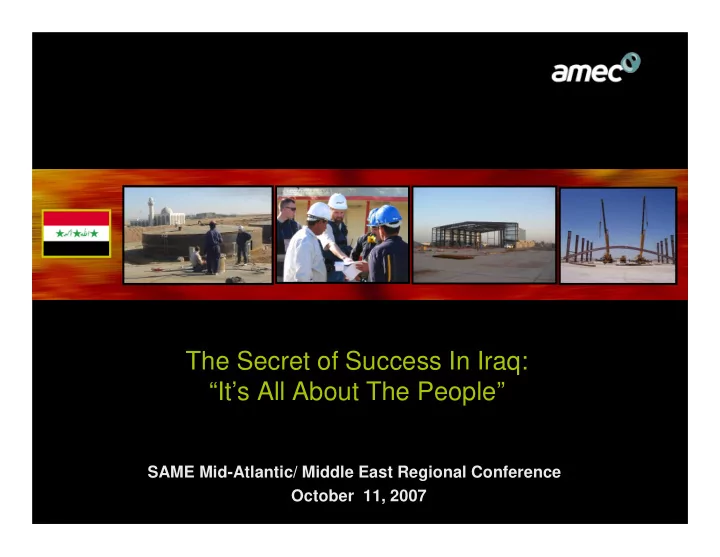

The Secret of Success In Iraq: “It’s All About The People” SAME Mid-Atlantic/ Middle East Regional Conference October 11, 2007
Cultural Challenges In Iraq & Beyond � DoD & Industry Will Continue To Work Globally & Face Cultural Challenges � Projects Will Often Be In Remote, Austere & Hostile Environments � Overcoming Cultural Challenges Is Key To Successful Projects
AMEC’s Lessons Learned On Cultural Challenges � Originates From A Long History Of ‘Frontier’ Services In the Middle East for In Africa for over over 50 years 50 years In China for over In South America for 70 years over 25 years In Caspian Sea, Caucasus and Central Asia for over 10 years
AMEC’s Experience In Iraq � Oil & Gas Projects Since The 80s � USACE: Design/Build Projects At 27 Sites (Under A JV): � AFCEE: Design/Build At 7 FOBs: � USACE Gulf Region District : MATOC At Taji � JCCI : Projects In North, Central, & South Iraq � Subcontractor On CETAC, AFCAP, & GCC Task Orders
Project Failures Due To Cultural Challenges? � Company A Unable To Complete A Project Due To Tribal Disputes � Company B Received An Unfavorable Audit Report Due To Poor Quality � Company C Had A 40% Cost Overrun With No Major Changes or Impacts � John Doe Was Caught With A Large Sum Of Cash – Kickbacks From Local Subcontractors Are Suspected Could This Have Been Averted?
What is Culture? “ The system of shared Beliefs , Values , Customs , Behaviors , and Communication that people use to cope with their world and with one another” Franz Boas ( 1858-1942)
Intercultural Challenges � Different Cultures Communicate Differently � It Is Not Easy To Become Aware Of Cultural Differences � We Tend To See Cultural Differences Through The Prism Of Our Own Culture � When Differences Are Not Perceived As Differences, They Are Perceived As Right & Wrong
Bottom Line Is…. � Learn: This Is Not An Easy Topic, You Have To Work At It � Be Genuinely Open-Minded: There Is No Right Or Wrong � Use Cultural Awareness: The Rewards Are Great
“It’s All About The People” The Project Team Expatriates Iraqis � In-House Staff � Subcontractors � The Client � The Client’s Client � The Community
Learn: A Little History About Iraq � Ancient Times (3000 BC to 550 BC): – Sumerians & Akkadians – Babylonians, Mitanni, & Assyrians – Chaldeans, Nebuchadnezzar II Of Babylon � Persian Domination (550 BC to AD 652) � The Arab Conquest & The Early Islamic Period � The Turkish Conquest � Modern History – British Mandate WWI – The Iraqi Monarchy – The Republic � Saddam’s Era � Iran/Iraq War � Invasion Of Kuwait & The Persian Gulf War � Iraq Under UN Sanctions � 2003 Invasion Of Iraq
Iraq’s Cultural Layering � Religion, Mostly Islam, Is A Predominant Factor � Trust Is In The Family &, For Many, In The Tribe � Pride In The Rich History & In The Vast Natural Resources � Cognizant Of The Importance Of Education � Distrustful Of Foreign Interferences � Skeptical About The New Government
Be Open-Minded When In Rome, Do What The Romans Do
First Things First: Greeting!! Hi Hello Good Morning
When In Camp David, … … Do What The Saudis Do
How the Arabic & American Cultures Differ? Most Scholars Tend To View The American & Arabic Cultures as Opposites: � Low Context vs. High Context � Direct vs. Indirect � Written vs. Aural & Oral
Cultural Variation Of Messages
High Context/Indirect
Case Study Use Of Cultural Awareness: Taji Base, Iraq
The Taji Base
The Strategy For Project Success: 1. Understand The Objectives 2. Plan The Project Execution 3. Train, & Deploy Resources 4. Use Cultural Awareness
Understand The Objectives
The Security Challenges Infiltration Attempts Suicide Car Bombs Mortars & Rockets Snipers IED Ambushes
Plan The Project Execution � Exclusive Use Of Iraqi Subcontractors � Engage The Local Community � Assign Arabic Speaking Key Project Staff � Adopt A Low Profile Security Approach
Train & Deploy Resources
The Main Problem To Address: � Who Is Attacking/Shooting? � Can We Reduce These Attacks? � How Do We Get The Local Community’s Support?
Meeting The Sheikh – The American Style
Listening To The Sheikh
The Meetings Continued – The Arabic Way
Progress!!
Plan Forward: More Local Workers Outreach & Training
H&S and UXO Training In Arabic
The Results of Cooperation � 405 New/Renovated Buildings & Infrastructure � 305,100 m 2 of Building Construction or 74 Football Fields
Leave The Place Better Than You Found It
AMEC Initiatives In Iraq � Informal Mentor Protégé Program � Training Program for Engineers & Workers � Operation Iraqi Children
Nationwide Water Conservation & Rehabilitation Project � Over $20M in tools, materials, and equipment issued � Seventeen Cities Participated � Safety, pumps, valves, leak detection, leak repair, and electrical training completed � Trained Workers Successfully Performing Repairs Dahuk * * Mosul * Erbil Kirkuk * * Suleymaniyah * Samarra * Baqubah Fallujah * * Kut Karbala * *Hillah * Najaf * Amarah Samawah * * Diwaniyah Nasiriyah * Basrah *
Capacity Development
Lessons Learned In Iraq � Deploy Staff Interested In Other Cultures � Invest In Cultural Awareness: – Trust & Long Term Relationships Are Key – Don’t Use High Pressure Tactics / Don’t Criticize Directly – Show Respect & Courtesy At All Times � Be Patient, It Takes Time To Understand Cultures
“A man's worth depends on his two smallest organs: his heart and his tongue” – Arabic Proverb
Recommend
More recommend